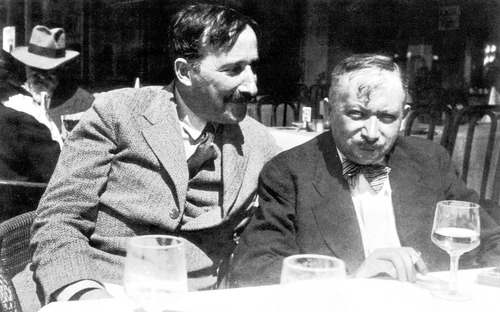
A Conversation About Stefan Zweig and Joseph Roth
The following is a panel discussion that took place at McNally Jackson last October on the occasion of New Directions’s reissue of Joseph Roth’s The Hundred Days. The panel included Richard Panchyk, author, editor, and translator of twenty-three books; George Prochnik, author of The Impossible Exile, a biography of Stefan Zweig; Tess Lewis, a translator from the German and French and an advisory editor of The Hudson Review; and Sophie Pinkham, doctoral student at Columbia University’s Slavic department. The event was hosted by Joshua Cohen, new books columnist for Harper’s and author of six books including Witz, Four New Messages, and the forthcoming novel, Book of Numbers.
Special thank you to McNally Jackson Bookstore, New York Review of Books, and Michael Barron at New Directions.
I. RESPECTIVE ORIGINS
JOSHUA COHEN: Hello. Thank you all for coming out. I see a handful of people in the audience who know much more about both of these writers than I do. So I should just leave right now. … Excuse my voice. I just got off a two-and-a-half month book tour in Germany, Austria, and Switzerland. So this might be the last subject I want to speak about. If this were a panel run by Joseph Roth we’d be drinking already. If this were a panel run by Stefan Zweig, your moderator would be much better prepared—fussily prepared, neurotically prepared.
With the translator’s permission, I’ll read a bit from this book, The Hundred Days, which is a telling of Napoleon’s return to, and fall from, power. The bit that I’m going to read comes just before Napoleon dictates his abdication to his brother. So the him—the he—here is Napoleon:
That night found him sleepless. It was somber and sultry. All the millions of stars were up in the silvery blue heavens, but when the Emperor gazed at them, they seemed not to be real stars, just the pale, distant images of genuine stars. That night he once again felt he could see right through the seemingly sublime intuitions of the Ruler of the Universe. He had yet to really know God but he now believed he could see right through Him. The Emperor believed that God too was an Emperor but a wiser, more cautious and therefore more lasting one. He, however, the Emperor Napoleon, had been foolish through arrogance; he had lost power through arrogance. Without that arrogance, he too could have been God, created the blue dome of the heavens, regulated the brilliance and position of the stars, and orchestrated the direction of the wind, the drifting of the clouds,...
You have reached your article limit
Sign up for a digital subscription and continue reading all new issues, plus our entire archives, for just $1.50/month.
Already a subscriber? Sign in




